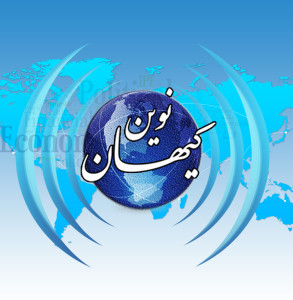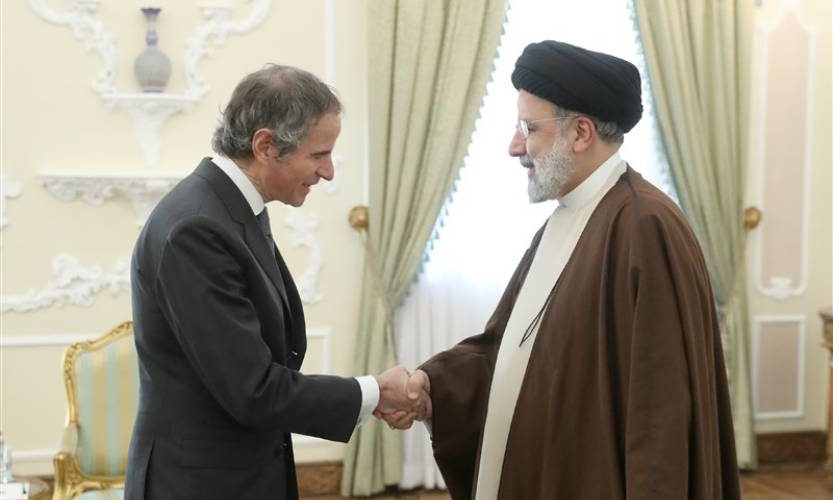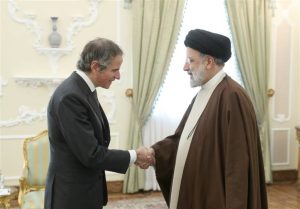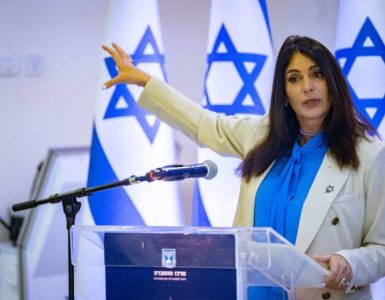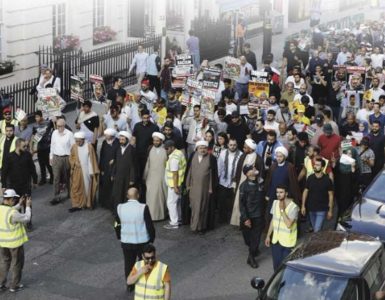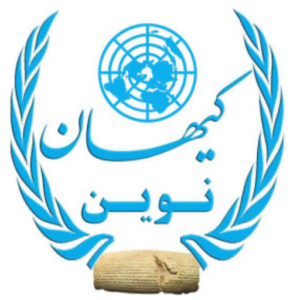با سفر رافائل گروسی مدیرکل آژانس بینالمللی انرژی اتمی به تهران نه تنها اختلافات میان جمهوری اسلامی و آژانس کمتر نشد بلکه از اظهارات مقامات حکومت چنین به نظر میرسد که بین خودشان هم اختلاف بر سر نحوه همکاری با تیم بازرسان آژانس بیشتر شده است.
With the visit of Rafael Grossi, the Director General of the International Atomic Energy Agency, not only did the differences between the Islamic Republic and the Agency not decrease, but from the statements of the government officials, it seems that the differences between them have increased over the way to cooperate with the Agency’s inspection team.
کیهان نوین: طبق بیانیه مشترک جمهوری اسلامی و آژانس توافق شده تهران اطلاعات و «دسترسی بیشتر به سه مکان» مربوط به مسائل پادمانی [فعالیتهای اتمی نظامی] در مریوان، تورقوزآباد و ورامین را ارائه میدهد اما ساعاتی بعد سخنگوی سازمان انرژی اتمی جمهوری اسلامی این موضوع را انکار کرد.
در بیانیه مشترک آمده است که جمهوری اسلامی به صورت داوطلبانه به آژانس برای «نظارت و راستیآزمایی بیشتر» دسترسی میدهد اما این بند از بیانیه نیز انکار شد.
پایگاه خبری «نور نیوز» وابسته به شورای عالی امنیت ملی جمهوری اسلامی در توییتی «خبر دسترسی به افراد و اماکن سهگانه مورد ادعای آژانس و یا نصب دوربینهای جدید» را «کذب» خواند.
گروسی پس از بازگشت از تهران در یک کنفرانس خبری گفت «بر سر اعزام تیمی به ایران، راهاندازی دوباره تجهیزات نظارتی و افزایش ۵۰ درصدی بازرسی در سایت فُردو» توافق شده اما مقامات رژیم ایران این سخنان را تکذیب کردند.
سارا فلاحی عضو کمیسیون امنیت ملّی مجلس شورای اسلامی: «اظهارات گروسی با چیزی که توافق شده بود مغایرت داشت… گروسی و آژانس بر اساس اطلاعات درست ایران گزارش نمیدهد و تحت تاثیر لابی صهیونیستها و آمریکاست».
به نظر میرسد در حکومت دو جریان قدرتمند موافق و مخالف توافق در بالاترین ردههای نظام با هم درگیر هستند. یک گروه که منفعت جمهوری اسلامی را عقبنشینی در مقابل غرب میداند و دیگری آنانکه بر «مقاومت» اصرار دارند و طبق الگویی مشابه کره شمالی، چشم به معجزات بمب اتم برای بقای نظام دوختهاند.
حشمتالله فلاحتپیشه رئیس پیشین کمیسیون امنیت ملی مجلس شورای اسلامی میگوید: «موضوع هستهای باید از کانون رقابتهای داخلی و از میز قمار قدرتها خارج شود و بهترین کار این است که پرونده هستهای به شورای عالی امنیت ملّی منتقل شود».
رافائل گروسی وقتی به نمایندگی از سازمان ملل به مأموریت میرود معمولا شخصاً از تأسیسات یا نیروگاهها بازدید میکند اما در مورد ایران تا حال تصویری از او حین بازدید از تأسیسات اتمی رژیم منتشر نشده و خبری مبنی بر اینکه آیا خودش در این اماکن حضور یافته یا نه در دست نیست.
در سفر اخیر مدیرکل آژانس به تهران او علاوه بر محمد اسلامی رئیس سازمان انرژی اتمی جمهوری اسلامی با ابراهیم رئیسی معروف به «قاضی مرگ» و حسین امیرعبداللهیان وزیر خارجه دولت سیزدهم نیز دیدار کرد. شنبه شب ۱۳ اسفند ساعاتی پس از این دیدارها اعلام شد طرفین یک بیانیه مشترک صادر کردهاند.
این بیانیه شامل توافقی با سه بند است:
۱) ادامه تعاملات بین آژانس و ایران با روحیه همکاری و رعایت تعهدات
۲) اعلام آمادگی جمهوری اسلامی برای ارائه اطلاعات و «دسترسی بیشتر به سه مکان» مربوط به مسائل پادمانی [فعالیتهای اتمی نظامی] که در مریوان، تورقوزآباد و ورامین قرار دارند.
۳) اجازه داوطلبانه جمهوری اسلامی به آژانس برای «نظارت و راستیآزمایی بیشتر» به بازرسان آژانس
در شرایطی که خبرگزاری تسنیم وابسته به سپاه پاسداران انقلاب اسلامی خبر از «خرسندی گروسی از توافق به دست آمده در تهران» داده، پایگاه خبری «نور نیوز» وابسته به شورای عالی امنیت ملی جمهوری اسلامی در توییتی «خبر دسترسی به افراد و اماکن سهگانه مورد ادعای آژانس و یا نصب دوربینهای جدید» را «کذب» خوانده است.
در این توییت آمده «مهمترین نتیجه سفر مدیرکل آژانس به تهران، دستیابی به الگوی مشترک برای تسریع در همکاریهای پادمانی در چارچوب وظایف ایران و اختیارات قانونی آژانس با رعایت قانون اقدام راهبردی بوده است.»
رافائل گروسی نیز مانند همیشه بعد از بازگشت از ایران در وین یک نشست مطبوعاتی برگزار کرد. وی درباره نتیجه مذاکراتش با مقامات جمهوری اسلامی گفت، «تمهیداتی در مورد راستیآزمایی در برخی مکانها و موضوع نظارتهای آژانس در ایران انجام شد.»
وی افزود: «تنها چیزی که مهم است اینست که بر هر گرم از غنیسازی اورانیوم که در این ایران صورت گرفت ما نظارت داشته باشیم… اطلاعاتی نداریم که بگوییم ایران دنبال ساختن بمب اتمی است. این برایمان مهم است که به فعالیت هستهای ایران دسترسی داشته باشیم. به دنبال توافق بودیم و نه قول گرفتن. راه سختی پیش روی ما و ایران است.»
وی در پاسخ به پرسشی درباره «اطلاعات ملموس در مورد تضمینهای ایران» گفت: «میدانید، ما نیاز به گفتگو و دسترسی به برخی اطلاعات و مکانها داریم. ما میخواهیم درباره آنها گزارش تهیه کنیم. ما [در ایران] درباره نظارتها بحث کردیم. اگر بخواهم بگویم که مثلاً در فلان تاریخ دقیق از مریوان یا تورقوزآباد بازدید میکنیم، نه، در این ارتباط حرف نزدیم. به صورت کلی درباره نظارتهای آژانس حرف زدیم. ما درباره انگیزه و دلایل اقدام [ایران] صحبت نمیکنیم. به یک درک روشن برای حل و فصل مسائل پادمانی رسیدیم.»
مهمترین مسئلهای که گروسی به آن اشاره کرده «توافق بر سر اعزام تیمی به ایران، راهاندازی دوباره تجهیزات نظارتی و افزایش ۵۰ درصدی بازرسی در سایت فُردو» است.
انکار توافق
ساعاتی بعد اما بهروز کمالوندی سخنگوی سازمان انرژی اتمی جمهوری اسلامی در مصاحبه با ایرنا منکر این توافق شد و گفت: «در مورد نصب دوربینها صحبت یا توافقی صورت نگرفته است… حتا اگر چنین درخواستی مطرح میشد بطور قطع ما با آن مخالفت میکردیم.»
سخنگوی سازمان انرژی اتمی در مورد توافق با آژانس برای دسترسی به سه مکانی که آژانس خواستار بازرسی آنهاست گفت: «هیچ بحثی در مورد میزان دسترسی بدون محدودیت به سه مکان ادعایی مطرح نشده است و با توجه به دسترسی قبلی به این مکانها اصولاً لزومی به دسترسی بیشتر دیده نمیشود و آژانس نیز تا کنون چنین درخواستی نداشته است.»
به این ترتیب دیده میشود که مقامات جمهوری اسلامی حتا مفاد آنچه را که به عنوان بیانیه مشترک صادر شده بود رد کردهاند!
هرچند عباس مقتدایی نایب رئیس کمیسیون امنیت ملّی صدور بیانیه مشترک را «نشان دادن حسن نیست و روحیه همکاری» خوانده است اما سارا فلاحی عضو کمیسیون امنیت ملّی مجلس شورای اسلامی روز ۱۴ اسفند گفت «اظهارات گروسی با چیزی که توافق شده بود مغایرت داشت.» منظور او همان اظهاراتی است که رسانههای حکومتی به گروسی نسبت دادهاند.
فلاحی ترجیعبند مقامات ارشد جمهوری اسلامی را تکرار کرد و افزود: «گروسی و آژانس بر اساس اطلاعات درست ایران گزارش نمیدهد و تحت تاثیر لابی صهیونیستها و آمریکاست.»
آنطور که گفته شد قرار است یکشنبه بعد از ظهر ۱۴ اسفند رئیس سازمان انرژی اتمی جمهوری اسلامی درباره سفر گروسی با نمایندگان کمیسیون امنیت ملی مجلس شورای اسلامی جلسه داشته باشد.
همزمان با این اظهارات میخائیل اولیانوف نماینده روسیه در مذاکرات اتمی نیز در توییتی نوشت «حذف دوربینها از تأسیسات هستهای ایران نتیجه قطعنامه سه کشور اروپایی با حمایت آمریکا در شورای حکام علیه ایران بود.»
وی افزود: «جبران این اشتباه استراتژیک غیرمسئولانه کار سادهای نیست.»
اولیانوف همچنین درباره افشای اطلاعات هستهای ایران در رسانههای غربی نوشت: «برخی از کشورهای عضو آژانس بینالمللی انرژی اتمی همیشه اطلاعات حساس را افشا میکنند، این تقصیر دبیرخانه آژانس نیست.»
وی تأکید کرد: «به احتمال زیاد میتوانیم کشورهای عضوی را شناسایی کنیم که اطلاعات محرمانه را به منظور پیچیدهتر کردن بحثها در شورای حکام آژانس افشا میکنند.»
توییتهای اولیانوف تأیید اظهارات تحلیلگران و ناظرانی است که معتقدند خود روسها از موانع اصلی توافق میان جمهوری اسلامی و غرب هستند.
در هر صورت به نظر میرسد در حکومت ایران دو جریان قدرتمند موافق و مخالف توافق در بالاترین ردههای نظام با هم درگیر هستند. یکی گروهی که منفعت جمهوری اسلامی را عقبنشینی در مقابل غرب میداند و دیگری آنانکه بر «مقاومت» اصرار دارند و در الگویی مشابه کره شمالی، چشم به معجزات بمب اتم برای بقای نظام دوختهاند.
در همین ارتباط حشمتالله فلاحتپیشه رئیس پیشین کمیسیون امنیت ملی مجلس شورای اسلامی میگوید: «موضوع هستهای باید از کانون رقابتهای داخلی و از میز قمار قدرتها خارج شود و بهترین کار این است که پرونده هستهای به شورای عالی امنیت ملّی منتقل شود.»
New Universe:
According to the joint statement of the Islamic Republic and the agreed agency, Tehran provides information and “further access to three places” related to safeguarding issues [of military nuclear activities] in Marivan, Torquzabad and Varamin, but hours later, the spokesman of the Atomic Energy Organization of the Islamic Republic denied this issue. did
In the joint statement, it is stated that the Islamic Republic voluntarily gives access to the agency for “further monitoring and verification”, but this paragraph of the statement was also denied.
“Noor News” news site affiliated with the Supreme National Security Council of the Islamic Republic called “the news of access to three people and places claimed by the agency or the installation of new cameras” as “false” in a tweet.
After returning from Tehran, Grossi said in a press conference that “an agreement has been reached on sending a team to Iran, restarting monitoring equipment and increasing 50% inspection on Fordo site”, but the Iranian regime officials denied these words.
Sara Falahi, a member of the National Security Commission of the Islamic Council: “Grossi’s statements were contrary to what was agreed upon…Grossi and the agency do not report based on the correct information of Iran and are under the influence of the Zionist and American lobby.”
It seems that in the government, two powerful currents in favor and against the agreement are fighting each other in the highest ranks of the system. One group that considers the benefit of the Islamic Republic to be retreating from the West, and the other is those who insist on “resistance” and, following a pattern similar to that of North Korea, look to the miracles of the atomic bomb for the survival of the system.
Heshmatullah Falahatpisheh, the former head of the National Security Commission of the Islamic Council, says: “The nuclear issue should be removed from the center of internal competition and from the gambling table of the powers, and the best thing is to transfer the nuclear case to the Supreme National Security Council.”
When Rafael Grossi goes on a mission on behalf of the United Nations, he usually visits facilities or power plants in person, but in the case of Iran, no picture of him visiting the regime’s nuclear facilities has been published, and no news has been released about whether he himself attended these places or not. not in hand
In the recent visit of the Director General of the Agency to Tehran, in addition to Mohammad Eslami, the head of the Atomic Energy Organization of the Islamic Republic, he also met with Ebrahim Raisi, known as “Death Judge” and Hossein Amirabdollahian, the Minister of Foreign Affairs of the 13th government. On Saturday night, March 13, hours after these meetings, it was announced that the parties had issued a joint statement.
This statement contains an agreement with three clauses:
1) Continuing interactions between the Agency and Iran in the spirit of cooperation and compliance with commitments
2) Declaration of the readiness of the Islamic Republic to provide information and “further access to three places” related to safeguard issues [military nuclear activities] located in Marivan, Torquzabad and Varamin.
3) Voluntary permission of the Islamic Republic to the Agency for “further monitoring and verification” of the Agency’s inspectors
In a situation where Tasnim news agency affiliated with the Islamic Revolutionary Guard Corps announced “Grousi’s satisfaction with the agreement reached in Tehran”, Noor News news site affiliated with the Supreme National Security Council of the Islamic Republic tweeted “News of access to three people and places He called the claim of the agency or the installation of new cameras “false”.
This tweet states, “The most important result of the visit of the Director General of the Agency to Tehran was the achievement of a common model to accelerate safeguarding cooperation within the framework of Iran’s duties and legal powers of the Agency, in compliance with the Strategic Action Law.”
Raphael Grossi, as always, held a press conference in Vienna after returning from Iran. Regarding the result of his negotiations with the authorities of the Islamic Republic, he said, “Preparations were made regarding verification in some places and the subject of the agency’s supervision in Iran.”
He added: “The only thing that is important is that we monitor every gram of uranium enrichment that took place in this Iran… We have no information to say that Iran is seeking to build an atomic bomb.” It is important for us to have access to Iran’s nuclear activities. We were looking for an agreement and not a promise. There is a difficult road ahead of us and Iran.”
In response to a question about “concrete information about Iran’s guarantees”, he said: “You know, we need to talk and access some information and places. We want to report on them. We [in Iran] discussed surveillance. If I want to say that, for example, we will visit Marivan or Torquzabad on a specific date, no, we did not talk about this. We talked about agency supervision in general. We do not talk about the motivation and reasons for [Iran’s] action. “We reached a clear understanding to resolve security issues.”
The most important issue that Grossi mentioned is “agreement on sending a team to Iran, restarting monitoring equipment and increasing 50% inspection on Fordo site”.
Denial of agreement
Hours later, Behrouz Kamalondi, the spokesman of the Atomic Energy Organization of the Islamic Republic of Iran, denied this agreement in an interview with IRNA and said: “There has been no discussion or agreement regarding the installation of cameras… Even if such a request was made, we would definitely oppose it.”
The spokesperson of the Atomic Energy Organization said about the agreement with the Agency for access to the three places that the Agency wants to inspect: “There has been no discussion about the amount of unrestricted access to the three alleged places, and considering the previous access to these places, there is no need for access in principle. It is not seen more and the agency has not made such a request so far.”
In this way, it can be seen that the authorities of the Islamic Republic have even rejected the contents of what was issued as a joint statement!
Although Abbas Moqtadaei, the vice-chairman of the National Security Commission, called the issuance of a joint statement “showing good deeds and not the spirit of cooperation”, but Sara Falahi, a member of the National Security Commission of the Islamic Council, said on March 14 that “Grosi’s statements were contrary to what was agreed upon.” He means the same statements attributed to Grossi by the government media.
Falahi repeated the recommendation of senior officials of the Islamic Republic and added: “Grossi and the agency do not report based on the correct information of Iran and are under the influence of the Zionist and American lobby.”
As it was said, the head of the Atomic Energy Organization of the Islamic Republic of Iran is supposed to have a meeting with the representatives of the National Security Commission of the Islamic Parliament on Sunday afternoon, March 14.
At the same time as these statements, Mikhail Ulyanov, Russia’s representative in the nuclear talks, tweeted, “The removal of cameras from Iran’s nuclear facilities was the result of the resolution of three European countries supported by the United States in the Council of Governors against Iran.”
He added: “Compensation for this irresponsible strategic mistake is not an easy task.”
Ulyanov also wrote about the disclosure of Iran’s nuclear information in the Western media: “Some member countries of the International Atomic Energy Agency always disclose sensitive information, this is not the fault of the IAEA Secretariat.”
He emphasized: “It is very likely that we can identify member states that disclose confidential information in order to complicate the discussions in the Agency’s Board of Governors.”
Ulyanov’s tweets confirm the statements of analysts and observers who believe that the Russians themselves are one of the main obstacles to an agreement between the Islamic Republic and the West.
In any case, it seems that in the government of Iran, two powerful currents in favor and against the agreement are in conflict at the highest levels of the system. One is a group that considers the benefit of the Islamic Republic to be retreating from the West, and the other is those who insist on “resistance” and, in a pattern similar to North Korea, look to the miracles of the atomic bomb for the survival of the system.
In this connection, Heshmatullah Falahatpisheh, the former head of the National Security Commission of the Islamic Council, says: “The nuclear issue must be removed from the center of internal competition and from the gambling table of the powers, and the best thing is to transfer the nuclear case to the Supreme National Security Council.”

